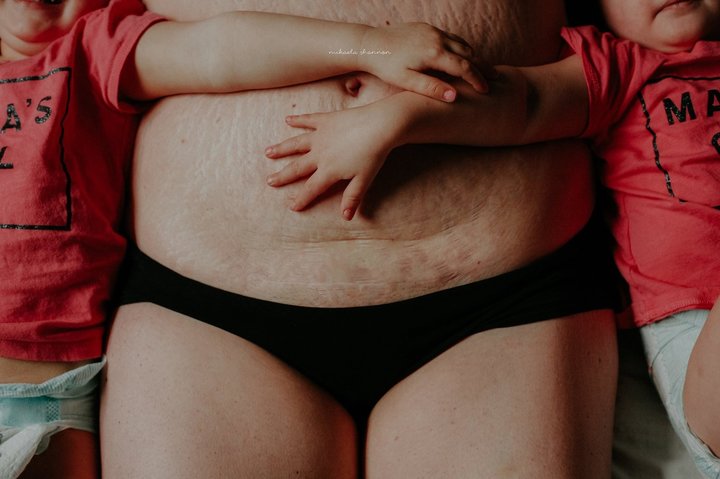On a regular day, after leaving my youngest at school, I came upon a magazine cover. A TV personality holds her new born baby, and states she is eager to return to the gym in a few days’ time. According to the magazine, she has an enviable figure. And perhaps because I am surrounded by these issues, through the women I work with, the themes of the Association (for the Rights of Women in Pregnancy and Childbirth), and as a mother and woman who has been through postpartum twice before, this title, this image, gave me much food for thought. That the media handles everything that has to do with pregnancy and childbirth really badly, with few exceptions, is nothing new. And now here was the postnatal time, so neglected both culturally and in health care, being totally denied, as if it did not exist. As if the goal to be achieved was for pregnancy and birth to be treated as if nothing has happened. As if they could be forgotten and overcome as soon as possible. And whoever wins this “race” is the one worthy of respect and admiration. Women should quickly “get their body back” and have an “enviable figure”. What does this tell us about how our Culture / Society views pregnancy, childbirth, motherhood, women, and women’s bodies? How do you measure a woman’s success and worth? Are we allowing women to honour their bodies through the process of pregnancy and childbirth they just went thought? What permission do we give them to adapt to life with this new child, and to that space immediately after giving birth? Enjoying your baby calmly, getting to know her, establishing and strengthening the bond with this Being who is new in your life, in your family?
I would like to encourage women to be loving and patient with themselves. Let them love their postpartum body, understanding what is happening to themselves. Respect your time and the baby’s. Clinically – and perhaps so for society at large – six weeks after the baby’s birth marks the end of the postpartum period. The reason for this is that perhaps things on the outside appear to be almost the same as before we are pregnant. But this is not necessarily so in terms of the body. The lochia stops (vaginal bleeding after childbirth); and the cervix and uterus return to normal. I would like to invite you all to reconsider this. While it´s 100% true that pregnancy and birth are not an illness, it is not less true that we need time to “come back to the world”.
I would like to encourage the media to be careful and sensitive in the way they treat these issues, because of their broad reach, and the influence they have in shaping public opinion.
Women are fabulous, they carry and give birth to a person. This is an extraordinary feat. What’s more, they can feed that little person. Let’s not judge women by praising them for being “thin”, for “not looking like they had a baby,” valuing their appearance, instead of valuing the experience they have gone through, holding space for them to be honoured and cared for. Let´s admit that perfection does not exist and that asking for the help you may need is legitimate and sensible.
To deny the postpartum and what it represents, the real postpartum, the so-called fourth trimester, is to have no notion of the profound transformations a woman undergoes during pregnancy and childbirth and the needs of a baby mammal.
That’s why I would like to tell you, mother that has just given birth: you’re doing a great job. Your house might be a mess. Your belly is still big. You may have stretch marks where your body has widened, grown, opened space to carry your child. And that is wonderful. It is what it is. Do not be ashamed. Be proud. You can stop, enjoy this time, your baby, and your family.
Let us focus our energy on supporting and welcoming mothers and families in such a way that one day a magazine can write: “So-and-so, radiant with her new daughter. With an enviable support network and calm. “

